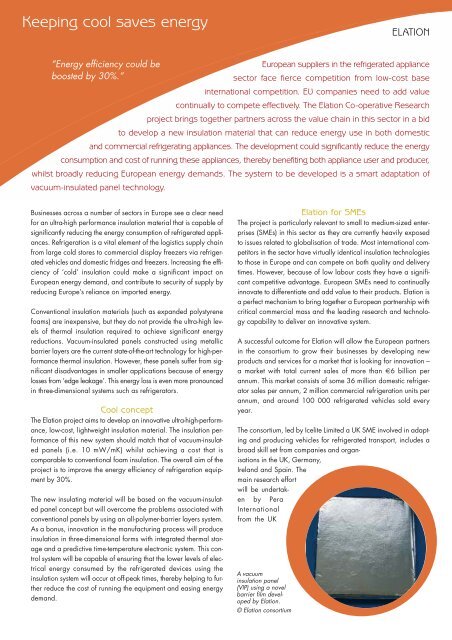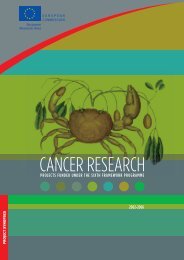Co-operative Research projects for SMEs - European Commission ...
Co-operative Research projects for SMEs - European Commission ...
Co-operative Research projects for SMEs - European Commission ...
You also want an ePaper? Increase the reach of your titles
YUMPU automatically turns print PDFs into web optimized ePapers that Google loves.
Keeping cool saves energy<br />
“Energy efficiency could be<br />
<strong>European</strong> suppliers in the refrigerated appliance<br />
boosted by 30%.”<br />
sector face fierce competition from low-cost base<br />
international competition. EU companies need to add value<br />
continually to compete effectively. The Elation <strong>Co</strong>-<strong>operative</strong> <strong>Research</strong><br />
project brings together partners across the value chain in this sector in a bid<br />
to develop a new insulation material that can reduce energy use in both domestic<br />
and commercial refrigerating appliances. The development could significantly reduce the energy<br />
consumption and cost of running these appliances, thereby benefiting both appliance user and producer,<br />
whilst broadly reducing <strong>European</strong> energy demands. The system to be developed is a smart adaptation of<br />
vacuum-insulated panel technology.<br />
Businesses across a number of sectors in Europe see a clear need<br />
<strong>for</strong> an ultra-high per<strong>for</strong>mance insulation material that is capable of<br />
significantly reducing the energy consumption of refrigerated appliances.<br />
Refrigeration is a vital element of the logistics supply chain<br />
from large cold stores to commercial display freezers via refrigerated<br />
vehicles and domestic fridges and freezers. Increasing the efficiency<br />
of ‘cold’ insulation could make a significant impact on<br />
<strong>European</strong> energy demand, and contribute to security of supply by<br />
reducing Europe’s reliance on imported energy.<br />
<strong>Co</strong>nventional insulation materials (such as expanded polystyrene<br />
foams) are inexpensive, but they do not provide the ultra-high levels<br />
of thermal insulation required to achieve significant energy<br />
reductions. Vacuum-insulated panels constructed using metallic<br />
barrier layers are the current state-of-the-art technology <strong>for</strong> high-per<strong>for</strong>mance<br />
thermal insulation. However, these panels suffer from significant<br />
disadvantages in smaller applications because of energy<br />
losses from ‘edge leakage’. This energy loss is even more pronounced<br />
in three-dimensional systems such as refrigerators.<br />
<strong>Co</strong>ol concept<br />
The Elation project aims to develop an innovative ultra-high-per<strong>for</strong>mance,<br />
low-cost, lightweight insulation material. The insulation per<strong>for</strong>mance<br />
of this new system should match that of vacuum-insulated<br />
panels (i.e. 10 mW/mK) whilst achieving a cost that is<br />
comparable to conventional foam insulation. The overall aim of the<br />
project is to improve the energy efficiency of refrigeration equipment<br />
by 30%.<br />
The new insulating material will be based on the vacuum-insulated<br />
panel concept but will overcome the problems associated with<br />
conventional panels by using an all-polymer-barrier layers system.<br />
As a bonus, innovation in the manufacturing process will produce<br />
insulation in three-dimensional <strong>for</strong>ms with integrated thermal storage<br />
and a predictive time-temperature electronic system. This control<br />
system will be capable of ensuring that the lower levels of electrical<br />
energy consumed by the refrigerated devices using the<br />
insulation system will occur at off-peak times, thereby helping to further<br />
reduce the cost of running the equipment and easing energy<br />
demand.<br />
Elation <strong>for</strong> <strong>SMEs</strong><br />
The project is particularly relevant to small to medium-sized enterprises<br />
(<strong>SMEs</strong>) in this sector as they are currently heavily exposed<br />
to issues related to globalisation of trade. Most international competitors<br />
in the sector have virtually identical insulation technologies<br />
to those in Europe and can compete on both quality and delivery<br />
times. However, because of low labour costs they have a significant<br />
competitive advantage. <strong>European</strong> <strong>SMEs</strong> need to continually<br />
innovate to differentiate and add value to their products. Elation is<br />
a perfect mechanism to bring together a <strong>European</strong> partnership with<br />
critical commercial mass and the leading research and technology<br />
capability to deliver an innovative system.<br />
A successful outcome <strong>for</strong> Elation will allow the <strong>European</strong> partners<br />
in the consortium to grow their businesses by developing new<br />
products and services <strong>for</strong> a market that is looking <strong>for</strong> innovation –<br />
a market with total current sales of more than €6 billion per<br />
annum. This market consists of some 36 million domestic refrigerator<br />
sales per annum, 2 million commercial refrigeration units per<br />
annum, and around 100 000 refrigerated vehicles sold every<br />
year.<br />
The consortium, led by Icelite Limited a UK SME involved in adapting<br />
and producing vehicles <strong>for</strong> refrigerated transport, includes a<br />
broad skill set from companies and organisations<br />
in the UK, Germany,<br />
Ireland and Spain. The<br />
main research ef<strong>for</strong>t<br />
will be undertaken<br />
by Pera<br />
International<br />
from the UK<br />
A vacuum<br />
insulation panel<br />
(VIP) using a novel<br />
barrier film developed<br />
by Elation.<br />
© Elation consortium<br />
ELATION

















